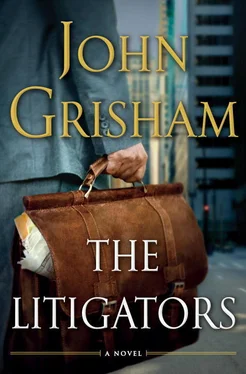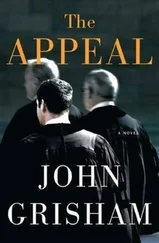It was a long, sad list, and Varrick Labs had paid dearly in the court of public opinion. Reuben Massey, though, continually reminded his troops of the hundreds of innovative and effective drugs they created and sold to the world. What he did not talk about, except in the boardroom, was the fact that Varrick had profited from every drug that had been targeted by the plaintiffs’ lawyers. So far, the company had won the battle, even after forking over huge settlements.
Krayoxx, however, could be different. There were now four lawsuits; the first one in Fort Lauderdale, the second in Chicago, and now two new ones in Texas and Brooklyn. Massey closely monitored the workings and dealings of the mass tort bar. He spent time each day with his in-house lawyers, studying the lawsuits, reading the bar journals and newsletters and blogs, and talking to his lawyers in big firms across the country. One of the most revealing signals in any looming war was TV advertising. When the lawyers began bombarding the airwaves with their sleazy, get-rich-quick come-ons, Massey knew Varrick was in for another expensive brawl.
Krayoxx ads were popping up everywhere. The frenzy had begun.
Massey had worried about a few of Varrick’s other targets. The migraine pill was a huge blunder, and he still cursed himself for ramming it through research and approvals. The blood thinner almost got him fired. But he had never doubted Krayoxx, nor would he ever. Varrick had spent $4 billion developing the drug. It had been tested extensively in clinical trials in third-world countries; the results had been spectacular. Its research was thorough and immaculate. Its pedigree was flawless. Krayoxx caused no more strokes and heart attacks than the daily vitamin pill, and Varrick had a mountain of research to prove it.
——
The daily legal briefing was held at precisely 9:30 in the Varrick boardroom on the fifth floor of a building that resembled a Kansas wheat silo. Reuben Massey was a stickler for punctuality, and his eight in-house lawyers were in their seats by 9:15. The team was led by Nicholas Walker, a former U.S. attorney, former Wall Street litigator, and the current mastermind behind every defense Varrick erected to protect itself. When the lawsuits began dropping like cluster bombs, Walker and Reuben Massey spent hours together, coolly responding, analyzing, scheming, and directing counterattacks when necessary.
Massey entered the room at 9:25, picked up an agenda, and said, “What’s the latest?”
“Krayoxx or Faladin?” Walker asked.
“Gee, I almost forgot about Faladin. Let’s stick to Krayoxx for the moment.” Faladin was an antiwrinkle cream that was allegedly causing wrinkles, according to a few loudmouthed lawyers on the West Coast. The litigation had yet to gain momentum, primarily because the lawyers were finding it difficult to measure wrinkleness, before and after.
Nicholas Walker said, “Well, the gates are open. Snowball’s rolling down the mountain. Pick your metaphor. All hell’s breaking loose. I chatted with Alisandros at Zell & Potter yesterday, and they’re getting flooded with new cases. He plans to push hard to establish multi-district in Florida and keep his finger on things.”
“Alisandros. Why do the same thieves show up at every heist?” Massey asked. “Haven’t we paid them enough over the past twenty years?”
“Evidently not. He’s built his own golf course, for Zell & Potter lawyers only and a few lucky friends, and he invited me to come down and play. Eighteen holes.”
“Please go, Nick. We need to see how wisely our money is being invested by these thugs.”
“Will do. I got a phone call late yesterday afternoon from Amanda Petrocelli in Reno, says she’s hooked her a few death clients, putting together a class, and will file suit either today or tomorrow. I told her it really didn’t matter to us when she filed suit. We can expect more filings this week and next.”
“Krayoxx is not causing strokes and heart attacks,” Massey said. “I believe in this drug.”
The eight lawyers nodded their heads in agreement. Reuben Massey was not one to make bold statements or false claims. He had doubts about Faladin, and Varrick would eventually settle for a few million, long before a trial.
Number two on the legal team was a woman named Judy Beck, another veteran of the mass tort wars. She said, “All of us feel the same, Reuben. Our research is better than theirs, if they actually have any. Our experts are better. Our proof is better. Our lawyers will be better. Perhaps it’s time we counterattack and throw everything we have at the enemy.”
“My thoughts exactly, Judy,” Massey said. “You guys have a strategy?”
Nicholas Walker said, “It’s evolving, but for now we go through the same motions, make the same public comments, watch and wait and see who files what and where. We look at the lawsuits, study the judges and the jurisdictions, and we pick our spot. When the stars are all aligned — the right plaintiff, the right city, the right judge — then we hire the hottest gunslinger in town and push hard for a trial.”
“This has backfired, you know,” Massey said. “Don’t forget Klervex. That cost us two billion.” Their miracle blood pressure pill was destined for greatness until thousands of its users developed horrific migraines. They — Massey and the lawyers — believed in the drug and rolled the dice with the first jury trial, which they fully expected to win in a slam dunk. An overwhelming victory would dampen the tort bar’s enthusiasm and save Varrick a ton of money. The jury, though, felt otherwise and gave the plaintiff $20 million.
“This is not Klervex,” Walker said. “Krayoxx is a much better drug, and the lawsuits are much weaker.”
“I agree,” Massey said. “I like your plan.”
At least twice a year, and more often if possible, the Honorable Anderson Zinc and his lovely wife, Caroline, drove from their home in St. Paul to Chicago to see their only son and his lovely wife, Helen. Judge Zinc was the chief justice of the Supreme Court of Minnesota, a position he had been honored to hold for fourteen years. Caroline Zinc taught art and photography at a private school in St. Paul. Their two younger daughters were still in college.
Judge Zinc’s father, and David’s grandfather, was a legend named Woodrow Zinc, who at the age of eighty-two was still hard at work managing the two-hundred-lawyer firm he’d founded fifty years earlier in Kansas City. The Zincs had deep roots in that city, but not deep enough to keep Anderson Zinc and his son from fleeing the harshness of working for old Woodrow. They wanted no part of his firm and left Kansas City, and this had caused a rift that was just beginning to mend.
Another rift was brewing. Judge Zinc did not understand his son’s sudden career change and wanted to get to the bottom of it. He and Caroline arrived in time for a late lunch on Saturday afternoon and were pleasantly surprised to see their son at home. He was usually at the office, downtown in a tall building. On a visit the previous year, they had never actually laid eyes on him. He came home after midnight on a Saturday, then left to return to the office five hours later.
Today, though, he was on a ladder cleaning the gutters. He jumped down and hurried to greet them. “You look great, Mom,” he said as he lifted her up and spun her around.
“Put me down,” she said. David shook hands with his father, but there was no hug. The Zinc men did not hug each other. Helen appeared from the garage and greeted her in-laws. She and David were both grinning goofily about something. He finally said, “We have some big news.”
“I’m pregnant!” Helen blurted.
“You two geezers are about to be grandparents,” David said.
Читать дальше












